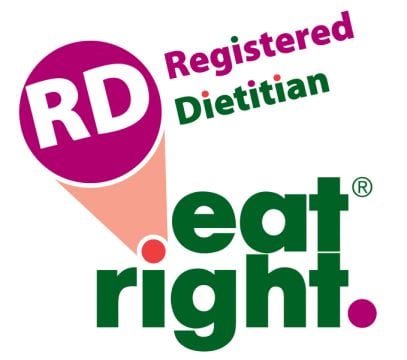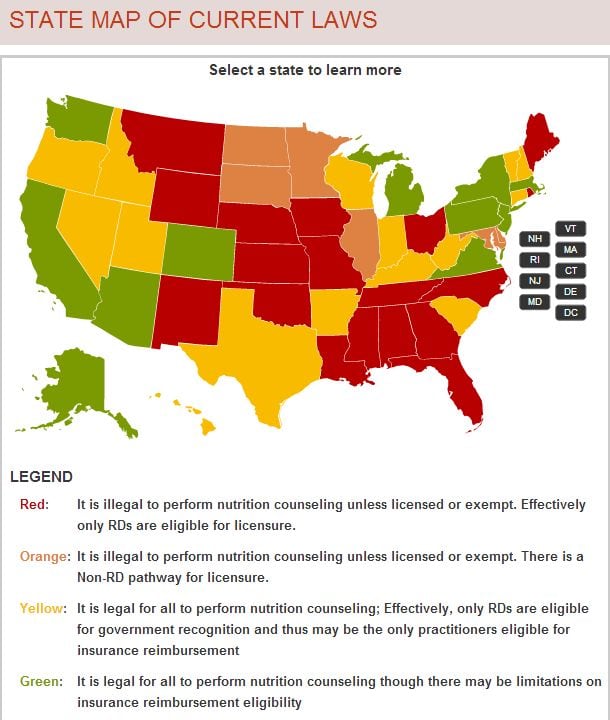What most people would probably say is that ‘qualified’ is the operative word, in that in order to gain a state license to practice, you should have some kind of relevant credentials or experience before telling other people what to eat.
But what is a relevant qualification? And are laws in some states so restrictive that they give RDs a de facto monopoly when it comes to operating in this field or at least obtaining a state issued credential (and the benefits it may confer such as insurance eligibility), effectively excluding scores of other professionals that are just as qualified?
The Certification Board for Nutrition Specialists (CBNS) - the certifying body for the Certified Nutrition Specialist (CNS) credential - says this is exactly what’s happening in over a dozen US states, and it’s deeply unfair.
The Association of Nutrition and Dietetics (AND), which represents RDs, says this is nonsense, and that licensing laws protect consumers from self-appointed experts and quacks.
So who is right? And how can states address legitimate concerns about who is qualified to tell us what to eat without creating laws that the CBNS claims are written by RDs for RDs, and create only one ‘pathway’ to licensure: Dietetics?
Undercover sting operations, aggressive investigations, and prosecutions

The Alliance for Natural Health USA, which represents natural health practitioners, has been campaigning to amend or overturn what it claims are overly-restrictive nutrition counseling laws in several states, campaigns and communications director Darrell Rogers tells FoodNavigator-USA.
And while progress has been made on this score, claims Rogers, a probe by the ANH-USA recently uncovered “widespread evidence” including “undercover sting operations, aggressive investigations, and prosecutions” that non-RD nutrition professionals are being targeted by state health departments that are “enforcing monopolistic laws sponsored by AND”.
According to Rogers, while many states recognize non-dietetics credentials such as the CNS, several states (click here for a state-by-state breakdown) make it illegal to refer to yourself as a nutritionist unless you are licensed by the state. (And to get licensed, you need RD credentials, education and experience, he says.)
“Non-RD nutrition professionals are being targeted by these states’ RD monopoly laws, despite the fact that many of them have advanced degrees and a tremendous number of clinical hours to their credit. They are being prosecuted for ‘practicing dietetics without a license’ or for referring to themselves as ‘a nutritionist’ in media or marketing materials.”
The ANH-USA adamantly opposes efforts to limit consumer choice by enacting laws that benefit one particular group
He adds: “One of the AND’s key agenda items is to pass ‘scope-of-practice’ laws in each state whereby only RDs can legally offer nutrition services—even basic services like providing nutrition advice or nutrition consulting.
“In our investigation into three years of records from four state dietetics boards [Florida, Ohio, North Carolina, Georgia], we did not find a single case of an unlicensed nutrition practitioner causing harm… and not a single case of a customer filing a complaint. Every complaint that spurred a subsequent investigation and prosecution was made at the behest of the Board itself, or from complaint forms submitted by RDs.”

While ANH-USA supports the AND’s desire to protect the term ‘Registered Dietitian’, he says, it “adamantly opposes efforts… to limit consumer choice by enacting laws that benefit one particular group.
“We believe in a competitive and open market for nutrition professionals, with consumers and employers (including hospitals) being able to decide what credentials, education, and experience they want in a nutrition provider.”
CBNS: Laws that exclude highly qualified non-RD nutrition professionals from licensure and prevent them from practicing by criminalizing their work are not in consumers’ best interests
But should anyone be able to slap the sign ‘nutritionist’ over the front door and start dishing out nutrition therapy, or gain a license to do so from the state?
Of course not, says CBNS executive director Michael Stroka, but laws that not only exclude highly qualified non-RD nutrition professionals from licensure, but prevent them from practicing altogether by criminalizing their work are not in consumers’ best interests, he argues.
For example, a PhD in Clinical Nutrition from a top regionally accredited university that has passed the CBNS exam and become a Certified Nutrition Specialist (CNS) and completed 1,000 hours of supervised experience, would be committing a crime by providing nutrition counseling in some states, he says.
“The CNS credential is only earned by masters or doctoral level health professionals from regionally accredited universities with demonstrated expertise and experience in science-based clinical nutrition, which is more sophisticated training in clinical nutrition than the undergraduate RD credential provides.”
There are important roles to play for those with a variety of levels and types of training
He adds: “There are important roles to play for those with a variety of levels and types of training.” All the CBNS is arguing is that “all nutrition practitioners be able to practice to the level of their training”.
And, ”if practitioners are defrauding the public by claiming to be something they are not, that conduct should be strictly prohibited”, he adds.
“A sensible framework would provide for top-level ‘licensure’ or ‘certification’ of highly credentialed nutrition practitioners, who have regionally accredited academic degrees or appropriate coursework in clinical health sciences and clinical nutrition, supervised experience, pass a rigorous science-based clinical nutrition examination, such as that for Certified Nutrition Specialists, and complete continuing education.”
Those without a license would not be prohibited from providing nutrition advice, but would insteadbe “required to fully and formally disclose to the public and clients that they are not licensed or certified by the state, and provide full disclosure of their training and credentials”, he suggests.
“There are many fine RDs, in fact many go on to obtain advanced degrees and then become Certified Nutrition Specialists. The problem is not with RDs but the national leadership of the AND which is driving this monopolistic agenda.”
AND: What the Academy opposes is unlicensed practitioners providing quack advice that harms patients

Not surprisingly, however, AND’s director of regulatory affairs Pepin Tuma takes a different view.
He tells us: “There is not [an RD] ‘monopoly’ on the provision of nutrition advice. Anyone can provide general, non-medical information, but states recognize health-care professionals should be licensed when they provide complex advice, such as medical nutrition therapy, tube feedings, and therapeutic diets in order to ensure the public is protected and practitioners are competent.
“Many licensed health-care and nutrition professionals—including doctors, naturopaths, nurses, physicians assistants, pharmacists, athletic trainers, and others—can provide complex nutrition advice if they’re licensed to do so.
“What the Academy opposes is unlicensed practitioners providing quack advice that harms patients. If holistic nutritionists, homeopaths, and naturopaths want to provide nutrition advice, they should be licensed and regulated as holistic nutritionists, homeopaths, or naturopaths—not licensed dietitian-nutritionists—to ensure the public is protected.”
We strongly encourage everyone to look closely at the state statutes and regulations to see the truth
But what about someone with an advanced degree in clinical nutrition?
“Although a couple of states such as Mississippi appear to require that one is an RD to become a licensed dietitian, they are, by far, the exception”, claims Tuma.
“Yes, many states do require licensed dietitian-nutritionists to pass an exam focusing on dietetics practice, but that is what applicants are being licensed to do.
“We strongly encourage everyone to look closely at the state statutes and regulations to see the truth. Many Ph.D. clinical nutritionists can become licensed and there is usually a pathway to licensure for non-RDs.”
Stroka: AND wishes to create a scope of practice that includes nutrition and dietetics, but only allows for dietetics training as the pathway for legal practice of that dual scope
But the CBNS’s Stroka argues that clinical nutrition professionals “focus on clinical nutrition, and thus have no desire to be called dietitians…They are not becoming licensed in order to practice dietetics; they are becoming licensed in order to provide medical nutrition therapy”.
Meanwhile, while the AND is correct in pointing out that “anyone can provide general, non-medical information”, such as telling people that oranges contain vitamin C, says Stroka, if they go on to recommend that a client eats oranges to obtain more Vitamin C, they are performing nutrition assessment and/or counseling, and in many states, that means they are breaking the law if they don’t have a license.
He adds: “The crux of the problem is that the AND leadership wishes to create a scope of practice that includes both nutrition and dietetics, but only allow for dietetics training as the pathway for legal practice of that dual scope. Their specialty is dietetics, while our group’s and other groups’ specialty is science-based clinical nutrition.”

While the AND says there is “usually a pathway to licensure for non-RDs”, in many states, this is a “mirage”, claims Stroka.
“The pathway the AND leadership refers to means a dietetics degree, a dietetics internship, and passing the dietetics exam. So, because clinical nutrition training is quite different from dietetics training, this pathway is a mirage. It is just another name for getting the RD credential.”
Legislators were unaware of the vast difference between dietitians and nutrition professionals
So where do things stand now across all the states?
According to Stroka, “until a few years ago… legislators were unaware of the vast difference between dietitians and nutrition professionals, and the AND was able to pass one-sided laws because opposition was dispersed.”
But in the past three years, he says, every one of the over one dozen attempts to get RD-oriented bills passed in states has been defeated.
However, there is no room for complacency says the ANH-USA’s Rogers, who argues that had an AND sponsored bill in Indiana passed earlier this year (HB 1272), anyone providing nutrition interventions (which the bill defined as "to positively change nutrition related behavior...for an individual”) would have required a state dietetic license.
Had this passed, “cooking class instructors, health coaches, PhD nutritionists and health food store employees would be breaking a law by attempting to positively change nutrition related behavior without a state license”, claims Rogers.
And new challenges are ahead, he claims, citing a federal bill (HR 2415, the Treat and Reduce Obesity Act of 2013) proposing that Medicare reimbursement be made available to RDs that offer weight loss counseling but not “most other nutrition professionals”.
Click here to see a state-by-state breakdown of laws governing the provision of nutritional counseling and therapy from the Center for Nutrition Advocacy (an initiative of the CBNS).
Click here to read more about the educational and professional requirements to become an RD.
Click here to find out more about the Certification Board for Nutrition Specialists (CBNS).
Do you work in this field? What are your thoughts? Please tell us what you think by using the Post a comment tab below this article.

